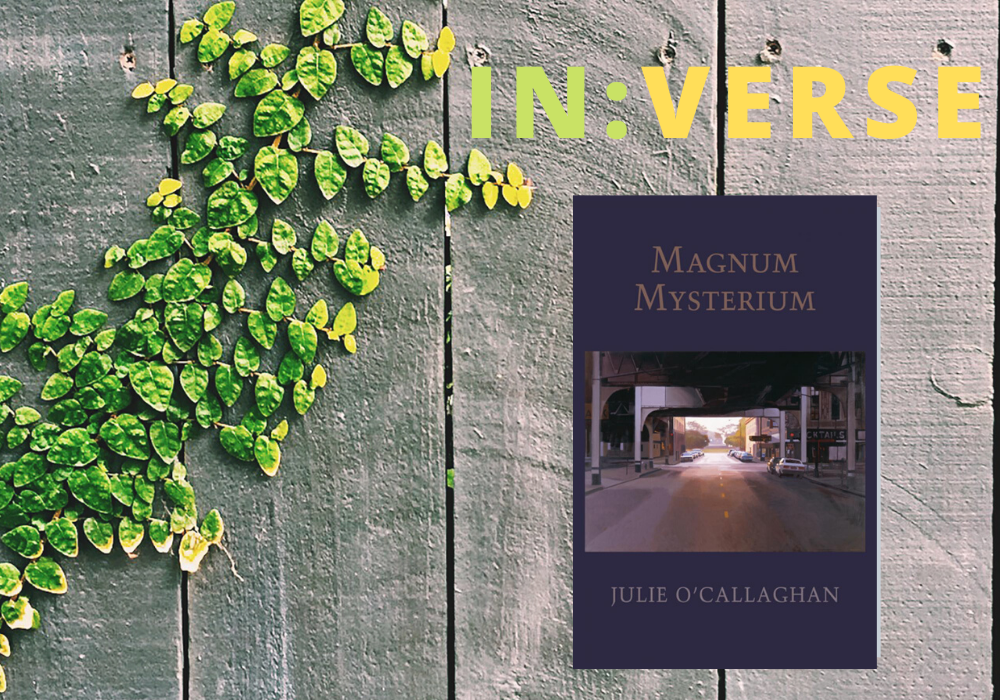
Magnum Mysterium.
by Julie O’Callaghan | Bloodaxe Books | 92pp | £10.99 pb | 9781780375144.
review by Fred Johnston
“O’Callaghan’s knack of naming cultural parts here is simple and exquisite. In any case, it’s a warning.”
A number of these poems are dedicated to, or in the active motion of remembering, O’Callaghan’s husband, the late poet and critic, Dennis O’Driscoll, who died in December 2012. Dennis O’Driscoll’s Stepping Stones (2009) is considered one of the finest works on Seamus Heaney, and O’Driscoll was considered one of the foremost literary critics of his time and a fine and popular poet. Born in Chicago, Julie O’Callaghan has lived in Ireland since her very early twenties and established herself as a fine and award-winning poet in her own right, and she is a member of Aosdána. The mystic Jacob Boehme’s Mysterium Magnum [sic] expounds upon the symbolism of the Book of Genesis; O Magnum Mysterium is a six-part work by Palestrina for the celebration of Christmas. Other composers and, no doubt, writers have utilised the phrase. The idea of a ‘great mystery’ has an alchemical ring to it.
Though the collection here is dedicated ut totem to Dennis O’Driscoll, O’Callaghan has provided a second section entitled ‘After Dennis O’Driscoll’, which one might read as a recognition of that poet’s influence on and contribution to her own work—as well as life—as well as a statement of creative separation and individualism. Poetry ‘couples’—how much does their work eventually intermingle in terms of style, theme and so on? How does one poetry communicate (if at all) with the other? Both O’Callaghan and O’Driscoll achieved a great deal in poetry, neither belonging to any of the various poetry ‘sects’ of Dublin City, nor striving in the muddy politics. In the very best sense, they remained themselves and unhampered.
Both have a sense of dry humour in their work; one might dare to suggest that O’Callaghan is the more whimsical, though comparisons are ultimately silly and serve no true purpose. It’s very easy to enter O’Callaghan’s poetry, to partake of the often refreshingly couched shrewdness, the easy-going, almost conversational American-ness in parts (one doesn’t easily escape one’s roots, nor should one):
The bruisers mosey down
to the store – trying to remember
what normal people eat.
There is a limit to tater-tots.
(Bruisers with Groceries)
Tater-tots? Grated potato, deep-fried. The poem reminded this reviewer of how many large tattooed men have tiny and visually inappropriate dogs for pets. In some of the poems we are undoubtedly revisiting America:
I need to find something …
Not behind the gates
of Ed Rusky Ford dealership.
Let’s skip Moody’s Pub and Grill.
It’s so hidden.
My father showed me how to find it
Many years ago.
I pass Dollar Discount,
Afro-Hair extensions …
(Hidden)
In the short six-line stab of ‘Things Without Merit’ O’Callaghan hits—and directly—upon the ephemera from which so much American contemporary culture takes its cue; Donald Trump merely built upon it:
Reality TV shows,
nuclear waste,
OTT bling,
Hollywood actors giving interviews,
pop-stars giving interviews,
sub-standard organic produce
Yet all of this unterkultur has long since become a staple of our own dangerous diet, and it might well not be written about America at all. Perhaps it’s not. This list, one thinks, could stretch out for miles. It’s a culture ruinous to intellectualism, to individualism. It’s Orwellian drip-feed. It is numbing. It is a mulch in which nothing at all grows. Or perhaps sinister things can flourish. O’Callaghan’s knack of naming cultural parts here is simple and exquisite. In any case, it’s a warning.
In the sometimes jerky (perhaps intentionally jerky, but never throw-away) lines, the poetry is both cosmopolitan and yet rooted in a pulsing lyrical core. She doesn’t invent allegories or metaphors in imaginative swathes. She is not hamstrung by the bulky traditionalism of much Irish poetry. She does not ‘begin’ with Clarke or Kavanagh. One thinks of, perhaps, the American voices of such as David Shapiro, without the word-blizzard; or to a lesser extent, the chatty yarn-telling of James Tate or the unpunctuated Michael Burkhard. Lacking solid myth to draw upon, contemporary American poetry seems on occasion to prefer to chat candidly and take the load off. (Only rap gets up and prances around the room, agitated.) But O’Callaghan’s poetry is revelatory, the chat isn’t always comfortable or comforting. She has a gift for surprises. The section ‘After Dennis O’Driscoll’ is lament and celebration, the poems more subdued and thoughtful, but never maudlin:
I walk off
into the drizzle
and glance back
at the rectangle of earth
I’ll sleep in with you
Someday
(Our Cliff)
I had everything
a cozy house
a genius husband
a happy life
a Sunday roast
a flower garden with gravel paths
and then one day …
(After Dennis O’Driscoll)
Unsurprisingly, these are quite personal poems, and, as such, are easy to access but not always so easy to review objectively. One or two are perhaps poetically light for this reviewer’s taste, however well they mark out a journey of memory and memorial. And mourning. And as such they bear a great weight of loss and absence, which finds expression as the poet best devises. This collection is thoughtful, balanced and well constructed. It is as good a record of the poet engaged truly and honestly with life as one will discover.
One quibble, though, and this with the publisher: the words in a fair number of the poems are set disquietingly wide, and the characters fall wide similarly. If this is unintentional, it nonetheless conveys the idea that it’s the poet’s stylistic doing. And I don’t believe it is.

Six-week online poetry course:
Poet and novelist Fred Johnston is offering again a six-session online course for those interested in writing prose or poetry. The series comprises six lessons with exercises and reading recommendations and feed-back on submitted work. Those interested should contact fred.poet@yahoo.com. Suitable for beginners and novices who have published work. Course fee is €100.











